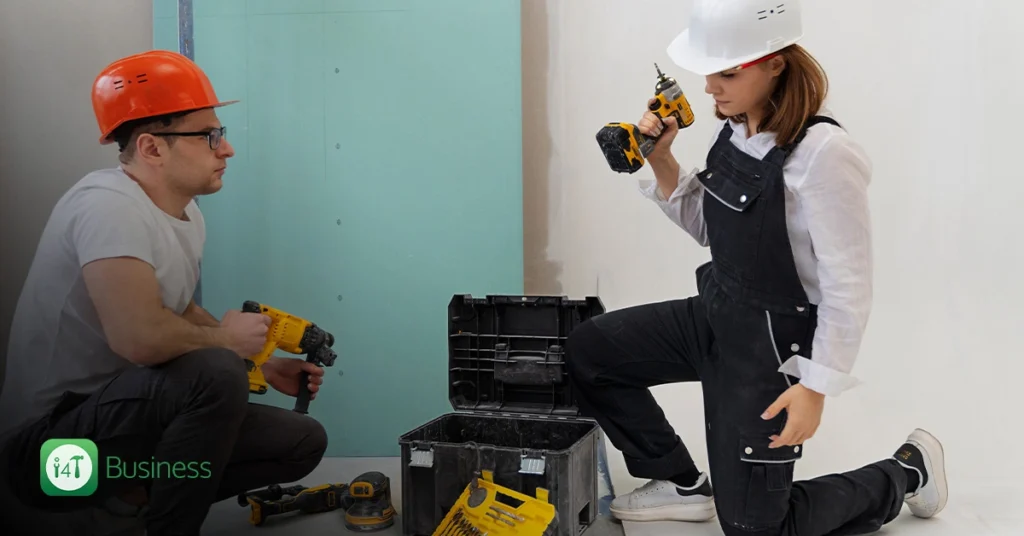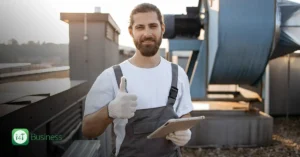Strata buildings are a bit different from your average property. They’re shared spaces where dozens, sometimes hundreds, of people live side by side. That means when something breaks, it doesn’t just affect one person; it can impact an entire community. From lifts and lighting to plumbing, painting, and fire safety, there’s a lot riding on regular upkeep.
This is where tradies step in. You’re not just fixing problems as they pop up; you’re helping strata managers keep everything safe, compliant, and comfortable for the people who call these buildings home. And when you do it well, you’re not only making life easier for residents, you’re also building trust with the managers who rely on you time and time again.
In this article, we’ll first touch on the importance of knowing the rules and responsibilities that come with strata work. From there, we’ll dive into the best practices every tradie should follow to stand out in the strata world and become the go-to choice for managers looking for reliable partners.
Know the Rulebook Before You Pick Up the Tools
Working on strata properties isn’t the same as doing a quick job at someone’s house. Strata managers are bound by strict rules around safety, compliance, and building standards, and they expect the tradies they hire to be across these too.
Fire safety checks, electrical compliance, waterproofing standards, and Work Health and Safety (WHS) requirements are just a few of the boxes that need ticking. If you’re across these obligations, you make the manager’s life easier and reduce the chance of delays, disputes, or rework.
Think of it this way: a tradie who understands the legal and safety side of the job isn’t just another worker; they’re a trusted partner. Strata managers notice the difference and are more likely to keep you front of mind for future work.
Best Practices for Strata Property Maintenance
Now that we’ve covered the basics of rules and compliance, let’s get into the heart of it: the best practices that help tradies shine in the strata space. These aren’t complicated, but they do make a big difference in how strata managers see you.
Spot Trouble Before It Spots You
Good maintenance isn’t just about fixing what’s broken; it’s about preventing bigger problems down the track. In strata buildings, small issues can quickly turn into major costs if they’re left unchecked. A leaking pipe can cause water damage to multiple units, a faulty smoke alarm can put lives at risk, and a loose stair rail could easily lead to injury.
Tradies who keep their eyes open for early warning signs show strata managers that they’re proactive, not reactive.
Even if you weren’t hired for that specific job, flagging a potential issue shows you care about the bigger picture. A simple note in your report, like, “Spotted a crack near the balcony railing, worth checking before it gets worse,” can save the manager from headaches later on.
Preventive maintenance plans are another great way to add value. Instead of waiting for something to break, suggest regular check-ups for plumbing, electrical, lifts, or fire systems. It positions you as a partner in keeping the building safe and cost-efficient, not just a one-off repairer. Managers will remember you as the tradie who helps them stay ahead of problems, not one who only shows up after things go wrong.
Speak the Same Language as Strata Managers
Strata managers juggle a lot; residents, owners, and committees all want answers yesterday. That’s why clear, quick communication is one of the most valuable things a tradie can offer. If you take days to send a quote or give vague updates, chances are the manager will move on to someone more responsive.
Keep your quotes straightforward and timely. Remember, strata managers usually need at least three quotes by law, so the faster you deliver, the better your chances. Avoid jargon when explaining what needs to be done.
Instead of saying “rectify the compromised waterproofing membrane”, say “reseal the bathroom floor to stop water leaking into the unit below”. This makes it easier for managers to explain the job to their committee or residents.
Regular updates also matter. If you’re running late or hit a snag, let the manager know straight away. A short text or email can prevent frustration and keep trust intact. Documentation helps too: photos, notes, and clear job reports mean the manager has evidence ready if anyone questions the work.
When you communicate in a way that makes a manager’s job easier, you’re not just doing the task; you’re solving their stress, and that’s what keeps you top of their list.
Show Up, Show Respect
Turning up when you say you will is the bare minimum. In strata buildings, professionalism goes beyond punctuality; it’s about respecting the fact that you’re working in someone’s home, often with dozens of neighbours affected by your presence.
Noise, dust, and blocked access can quickly frustrate residents. Being mindful of these things sets you apart. Simple gestures such as posting a sign that work is in progress, giving advance notice of noisy tasks, or cleaning up properly after yourself make a big difference. Residents notice, and so do managers.
Respect also extends to communication. If a resident stops you in the hallway with a question, answer politely or direct them to the manager if it’s not your call. How you interact with people reflects on the strata manager who hired you, and they’ll remember whether you made them look good or caused complaints.
Documentation is another part of professionalism. Sending through before-and-after photos or a quick completion report gives managers peace of mind and something concrete to pass on to their committee. When you show up consistently, treat residents with respect, and leave a tidy record of your work, you build trust that keeps the jobs flowing your way.
Trade the Clipboard for Smart Tools
Paper notes and endless text chains might work for a small private job, but they’re messy and unreliable when you’re dealing with strata maintenance. Strata managers need organised tradies who can deliver clear, trackable information. That’s where digital tools make all the difference.
Using job management software, mobile apps, or even simple online quoting systems makes you look more professional. It allows you to send quotes quickly, keep managers updated in real time, and provide reports with photos attached. For a strata manager, having a digital record of the work makes it easier to keep committees informed and justify decisions.
Think about the difference: one tradie hands over a crumpled piece of paper with barely legible notes. Another sends a clean, digital report with time stamps, photos, and costs. Who do you think the manager will call back next time?
Smart tools also help tradies themselves; no more lost paperwork, missed calls, or forgotten invoices. You can track jobs, schedule efficiently, and keep all details in one place. Embracing technology isn’t just about keeping up with the times, it’s about showing managers you’re serious about your business and making their job easier in the process.
Think Beyond the Job at Hand
Many tradies treat each job as a once-off: fix the issue, send the invoice, move on. But in strata work, building long-term relationships is where the real opportunities lie. Strata managers value tradies who think ahead and make their lives easier in the long run.
That could be as simple as following up a week after a repair to check everything’s still working, or leaving managers with advice on how to prevent future issues. For example, after clearing a blocked gutter, suggest a seasonal cleaning schedule to avoid repeat problems. These small touches show you’re invested in the building’s upkeep, not just the one-time fix.
It also pays to keep an eye out for opportunities. If you notice a building could benefit from energy-saving lights, improved safety signage, or better drainage, mention it. Managers appreciate tradies who take initiative and suggest solutions, as it helps them look proactive to their committees.
Over time, this approach builds a reputation. You stop being just another contractor on a contact list and become the manager’s go-to tradie for advice and repeat work. In a competitive space like strata maintenance, consistency and trust are what set you apart.
Protect Workers and Residents
When you’re working in strata buildings, safety isn’t just about protecting yourself; it’s about looking after the residents who live there too.
Unlike a private job site where you can control who comes and goes, common areas in strata properties are shared by dozens of people. That means kids running through hallways, residents walking past with shopping bags, or elderly neighbours using stairwells right next to where you’re working.
Tradies who take safety seriously stand out. Set up proper barriers or signage when working in shared spaces, keep tools and ladders out of walkways, and make sure chemicals are stored securely. Something as simple as a stray extension lead can become a major trip hazard if it’s not managed properly.
Machinery also needs extra care in busy buildings. Whether it’s a high-pressure cleaner, power saw, or lift servicing gear, make sure you’re not only using it safely but also minimising risks to residents around you. Noise, fumes, and dust can spread quickly, so plan ahead to reduce disruption.
Strata managers are ultimately responsible for what happens in their building. If you manage risks well, you give them peace of mind that their residents are safe and their liability is reduced. Over time, this builds trust and shows you’re a professional who values safety as much as getting the job done.
Manage Multiple Stakeholder Expectations
One of the trickiest parts of strata work is dealing with multiple stakeholders. On any given job, you might need to keep a strata manager updated, respond to questions from tenants, and satisfy the expectations of the owners’ committee. Each group has different priorities, and sometimes they don’t all line up.
The key is communication and patience. Keep your main point of contact, usually the strata manager, in the loop at all times, and let them handle bigger decisions. Be polite and professional with residents, but avoid making promises that might conflict with the manager’s instructions. If an owner or tenant approaches you directly with a request, the best response is often: “I’ll check with the manager and get back to you.”
Disputes can happen, especially when different stakeholders have different expectations. For example, a tenant might be frustrated by delays in a repair, while the committee wants the cheapest option. In these cases, your role is to provide clear facts and options, not to take sides. Supplying the manager with detailed reports, photos, and quotes gives them the tools to resolve conflicts fairly.
Tradies who handle these situations calmly and professionally make a manager’s life much easier. It shows you understand the complexities of strata work, and that reliability makes you the type of tradie they’ll keep coming back to.
Suggest Sustainable Upgrades
Sustainability is becoming a real priority for strata buildings across Australia.
Residents and committees are looking for ways to cut running costs, reduce environmental impact, and improve the value of their property. Tradies who can offer eco-friendly solutions are in a strong position to stand out.
Simple upgrades make a big difference. Swapping old lights for LEDs reduces energy bills and maintenance costs. Installing water-saving taps or dual-flush toilets helps lower water consumption across dozens of apartments. For larger projects, solar panels, energy-efficient hot water systems, and better insulation are now high on the list for many committees.
As a tradie, you don’t need to be an environmental consultant; just keep an eye out for opportunities. If you notice outdated lighting or inefficient systems while on a job, suggest an upgrade. Even small recommendations show you’re forward-thinking and invested in the long-term value of the building.
Sustainability is also a selling point. Committees often highlight green initiatives to attract buyers and tenants, and strata managers like working with tradies who can help them deliver on these goals. By positioning yourself as someone who can combine quality maintenance with eco-friendly improvements, you not only do your bit for the environment but also build a reputation as a modern, solution-focused tradie.
Over to you
Strata maintenance is about more than ticking off a job list. It’s about keeping communities safe, comfortable, and compliant while making life easier for the strata managers who rely on you.
At the end of the day, reliability and trust are what win repeat work. Strata managers want tradies they can count on; not just once, but every time. The more you show you understand their challenges and can make their job easier, the stronger your reputation grows.
If you’re ready to take your strata work to the next level, having the right systems in place can make all the difference. i4T Business job management software helps tradies connect directly with strata managers, streamline scheduling, send quotes faster, and keep all communication in one place. It’s designed to save you time, make you look more professional, and help you win more repeat work in the strata sector.
Take the step now to work smarter, not harder, and become the tradie every strata manager wants on speed dial.
FAQs
Strata property maintenance is the ongoing care and repair of shared spaces in apartment blocks, townhouses, or complexes. This includes lifts, stairwells, gardens, plumbing, electrical systems, and fire safety equipment.
Preventive maintenance helps catch small issues before they turn into costly repairs. Regular checks on plumbing, electrics, and safety systems save money and keep residents safe.
Tradies can build trust by being reliable, providing clear communication, sending timely quotes, and delivering professional reports. Thinking long-term also helps managers see you as a valuable partner.
Tradies should always set up barriers, signage, and safe work zones in common areas. Tools, ladders, and chemicals must be managed carefully to protect both workers and residents..
Tradies can suggest eco-friendly upgrades like LED lighting, water-saving systems, and solar panels. These solutions cut costs, reduce environmental impact, and improve the property’s long-term value.
Hot off the press!

With our cutting-edge technology and in-depth knowledge of how the
Field Service Management sector operates, the i4TGlobal Team loves to share industry insights to help streamline your business processes and generate new leads. We are driven by innovation and are passionate about delivering solutions that are transparent, compliant, efficient and safe for all stakeholders and across all touch points.




